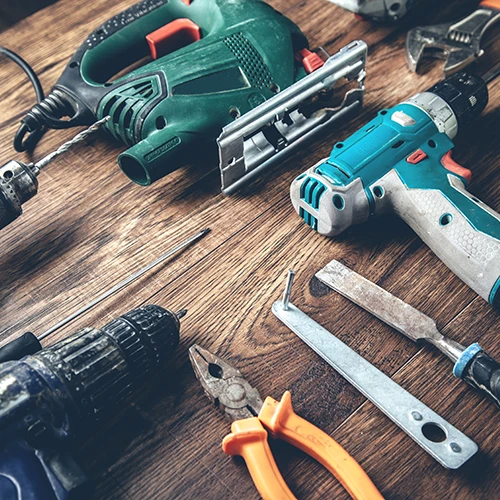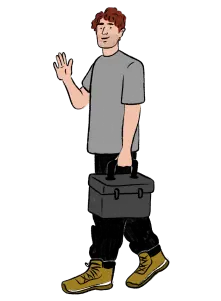Tools Insurance
Feel safe knowing that you have a back-up plan should the worst happen, thanks to comprehensive tools insurance.

Why choose Howden for Tools Insurance?
As a broker which specialises in business-related insurance, we pride ourselves on doing the heavy lifting, so you don’t have to. Thanks to the great relationships we have with our selected panel of standard and specialist insurers, we make the process of comparing multiple tools insurance policies, on your behalf, easy and straightforward. What’s not to like?
Here at Howden, we recognise that each policy needs to be as individual as its owner and their tools, and that’s why we provide a tailored, personalised service, focused on getting to know you and learning more about what you want from your specific insurance.
All in all, whether you need to make a claim, purchase a new policy, or renew an existing one, just know that we’re here to help.
Benefits of working with Howden:
- You can trust us – we’re rated Excellent on Trustpilot.
- We’re driven to save you time, money, and hassle.
- Benefit from a tailored service that comparison sites can’t provide.
- Speak with your local branch, within your community.
- We’re right by your side in the event of a claim.
What is Tools Insurance?
Tool insurance, often referred to as tool cover, is a form of business equipment insurance designed to safeguard the tools essential to your trade. If you work in a trade profession, your ability to complete your tasks depends on your tools, and it's likely you've made a significant financial investment in acquiring the right equipment. Tool insurance cover is intended to preserve the value of this investment. In the event, that your tools are lost or damaged, this insurance provides compensation to assist in replacing them.
Tools insurance cover typically include around-the-clock coverage, ensuring that your tools are protected at all times, whether they are at your residence, your place of business, or stored in your securely locked van. This coverage also extends to tools in transit, ensuring protection wherever your work takes you.
Is Tools Insurance worth it?
Lost or stolen tools, unfortunately, often means a loss of money, which no trader wants. That’s why getting tools insurance is absolutely worth it, because when something unfortunate happens to your tools, this policy can get you back on your feet and back to work quickly, typically through quick pay-outs.
So, whilst tools insurance isn’t mandatory or a legal requirement, the most important thing that you need to ask yourself is whether you could manage without your tools if they were lost, stolen or damaged. If the answer is no, then you should strongly consider taking out insurance, to avoid significant financial losses and loss of business.
More information about Tools Insurance
How does tool insurance work?
So, how does tools insurance work? Well, there’re three levels of tool insurance cover you can choose from:
Basic
This provides the least amount of coverage, but you are able to claim on your insurance for fire damage, storm damage, and damage resulting from a vehicle collision whilst in transit.
Standard
Offers the same as the basic cover, but you are also covered for tool theft, which makes this level far more popular than Basic policies.
Comprehensive
Everything mentioned in the lower levels of cover will be protected, as well as accidental damage, flooding and tools that are stolen in 'open air' (not in a secure location), making Comprehensive the most secure option.
It’s also worth noting that, whatever your trade, our business insurance providers will generally cover the following types of tools and equipment:
- Handheld tools- such as hammers, screwdrivers, and scissors
- Power tools - such as drills, chainsaw, and hairdryers
- Owned/leased tools - tools that you own or are currently renting
Overall, we understand how much you rely on your tools and equipment. That’s why we offer a wide range of policies that not only suit the collective value of the tools that you own, but also meet your personal requirements, leaving you safe in the knowledge that you can get the job done.
There're other related policies that we can help you with too, including public liability insurance, employers' liability insurance, van insurance cover, transit insurance, business equipment cover, and much more.
Overall though, you can take the first step towards accessing a tools policy from one of our insurers by getting in touch with us, whether it’s over the phone or meeting a member of our team in a Howden branch.
How much is tools insurance?
It’s the question we get asked the most, and unfortunately the question that’s hardest to answer. Ultimately, the cost of insuring your essential tools can differ among insurance companies and hinges on various factors, including:
- The quantity of tools you wish to insure
- The extent of coverage you require
- The nature of your occupation
- The specific tools you utilise
- The classification of your work vehicle or van
- The location where your tools are stored overnight (e.g., in a locked garage? in a vehicle overnight?)
- Your selection of the deductible amount
We recommend comparing multiple insurance providers and their policies against each other before buying anything. It’s important that you not only consider price too, but also the policy that aligns best with your requirements when making your comparisons.
Need help comparing your options? The team here at Howden can provide you with the support you need and help you compare various tool insurance policies.
Related Articles & Guides about Tool Insurance
Take a look at our scooter insurance articles and guides…
Tools stolen every 15 minutes – latest cost to the trade revealed
Tools Insurance FAQs
Are tools covered under car insurance?
Whether tools cover is included under a provider’s car insurance policy will ultimately depend on what they choose to offer. Typically though, comprehensive car insurance policies will incorporate a degree of personal possessions coverage, but it’s not typically included as a standard feature in third-party and third-party, fire, and theft policies.
For more clarity on this, you should either give us or call or get in touch with your insurance provider directly.
Does van insurance cover tools?
Yes, your van insurance policy could potentially protect your tools (and other contents), but you would most likely need to but this cover as a van insurance policy add-on. On the whole, van insurance doesn’t include tool cover as standard, but buying it as an added extra could be an option if that’s what you’re looking for.
Tradesman Insurance
Specialist cover for a wide range of trades
Our team can help you find comprehensive insurance options catered to all types of tradespeople and their businesses.
Contractors Insurance
Comprehensive all-risk cover for contractors
The right cover is vital for your contract success. We can help you cover everything on site — people, tools, materials, liability and more.
Goods In Transit Insurance
Professional insurance that delivers your goods
Trust that the goods you or your business is transporting is fully covered thanks to comprehensive goods in transit insurance

